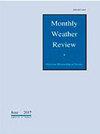大湖湖效事件期间的高位混合层:来自 OWLeS 的调查和案例研究
IF 3
3区 地球科学
Q3 METEOROLOGY & ATMOSPHERIC SCIENCES
引用次数: 0
摘要
安大略冬季湖泊效应系统(OWLeS)野外项目密集观测期(IOPs)发射的原始探空火箭数据显示,在 OWLeS 湖泊效应事件期间,对流层低层的高混合层(EMLs)在安大略湖附近比较常见。保守估计,在 290 次 OWLeS IOP 探测中,有 193 次存在 EML。从 OWLeS IOP 探测到的 EML 基压分布显示出两类 EML,一类的基压相对较低(900 - 750 hPa),另一类的基压相对较高(750 - 500 hPa)。假设前一类 EML(本研究的重点)有时是与个别五大湖有关的中尺度过程的结果。在 OWLeS 实地项目期间进行的一项案例研究中,WRF 再分析场提供了两种证据,证明低海拔基底 EML 可能来自湖泊效应边界层对流和相关的中尺度环流。首先,这种 EML 可在中尺度螺线环流的高层流出分支内形成。高空被抽走的大湖改良对流边界层空气就会位于静态稳定性更强的环境空气之上,形成 EML。其次,在没有中尺度螺线环流的情况下,当大湖改良对流边界层越过密度较大的环境空气时,也会形成这种 EML。再分析场显示,EML 和与大湖改良对流边界层相关的静态稳定性降低的层可以从其形成区域向下风向延伸数百公里。讨论了对运行的影响和未来研究的途径。本文章由计算机程序翻译,如有差异,请以英文原文为准。
Elevated Mixed Layers during Great Lake Lake-effect Events: An Investigation and Case Study from OWLeS
Data from rawinsondes launched during intensive observation periods (IOPs) of the Ontario Winter Lake-effect Systems (OWLeS) field project reveal that elevated mixed layers (EMLs) in the lower troposphere were relatively common near Lake Ontario during OWLeS lake-effect events. Conservatively, EMLs exist in 193 of the 290 OWLeS IOP soundings. The distribution of EML base pressure derived from the OWLeS IOP soundings reveals two classes of EML, one that has a relatively low-elevation base (900 – 750 hPa) and one that has a relatively high-elevation base (750 – 500 hPa). It is hypothesized that the former class of EML, which is the focus of this research, is, at times, the result of mesoscale processes related to individual Great Lakes. WRF reanalysis fields from a case study during the OWLeS field project provide evidence of two means by which low-elevation base EMLs can originate from the lake-effect boundary layer convection and associated mesoscale circulations. First, such EMLs can form within the upper-level outflow branches of mesoscale solenoidal circulations. Evacuated Great Lake-modified convective boundary layer air aloft then lies above ambient air of a greater static stability, forming EMLs. Second, such EMLs can form in the absence of a mesoscale solenoidal circulation when Great Lake-modified convective boundary layers overrun ambient air of a greater density. The reanalysis fields show that EMLs and layers of reduced static stability tied to Great Lake-modified convective boundary layers can extend downwind for hundreds of kilometers from their areas of formation. Operational implications and avenues for future research are discussed.
求助全文
通过发布文献求助,成功后即可免费获取论文全文。
去求助
来源期刊

Monthly Weather Review
地学-气象与大气科学
CiteScore
6.40
自引率
12.50%
发文量
186
审稿时长
3-6 weeks
期刊介绍:
Monthly Weather Review (MWR) (ISSN: 0027-0644; eISSN: 1520-0493) publishes research relevant to the analysis and prediction of observed atmospheric circulations and physics, including technique development, data assimilation, model validation, and relevant case studies. This research includes numerical and data assimilation techniques that apply to the atmosphere and/or ocean environments. MWR also addresses phenomena having seasonal and subseasonal time scales.
 求助内容:
求助内容: 应助结果提醒方式:
应助结果提醒方式:


